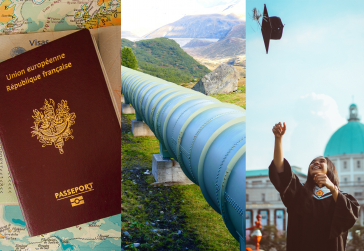SEnECa Blog Post: Strengthening the EU-Kazakh Relations: from Capacity to Feasibility

The European Union is one of the main economic and foreign policy partners of Kazakhstan. The Kazakh President Nursultan Nazarbayev always emphasizes the strategic significance of the EU in his annual addresses to the nation of Kazakhstan. Deep interaction with the European countries helps to promote democratic reforms, improve the quality of life, attract investments and new technologies as well as improve legislation (including rule of law) and modernize the system of public administration in accordance with existing standards.
The interaction of Kazakhstan with European countries is developing both bilaterally and multilaterally, including the EU supranational structures. Key priority areas for EU cooperation with Kazakhstan include:
(1) Political dialogue. The established political dialogue forms a strong basis for further development of bilateral relations. Kazakhstan actively interacts with key European institutions, such as the European Commission, the European Parliament and the Council of Europe as well as with related institutions such as the European Cultural Convention and the Venice Commission of the Council of Europe, which Astana recently joined. Among key issues of bilateral cooperation remain the facilitation of the visa regime and the possibility of the Kazakh airlines to fly to European countries.
(2) Energy and natural resources. Dialogue on energy issues is one of the key mutually beneficial areas of the Kazakh-European cooperation. Whereas Kazakhstan is the main supplier of Caspian oil and gas resources to Europe, the European Union is the largest trading partner of Kazakhstan. 80 percent of the Kazakhstan resources (oil and gas) are exported to the EU. Diversification of export routes for energy resources are of mutual interest, both for Kazakhstan and for the European Union. The interests of the EU are mainly focused on the Southern route for gas supplies to Europe.
(3) Culture and humanitarian cooperation. There is an annual dialogue on human rights with state bodies of Kazakhstan, regular meetings with NGOs and seminars with the participation of civil society of the EU and Kazakhstan. At this stage, priority areas include local government and the reform of the judicial system, which in turn will promote social cohesion, democratic development and respect for human rights. Cooperation in science and education plays a fundamental role in bilateral relations. Cooperation between the universities, vocational education and the adhering to international educational standards within the Kazakh education system are the key areas of cooperation between the EU and Kazakhstan.
2018 marks the 25th anniversary of the diplomatic relations between Kazakhstan and the EU. Therefore, the country and the people would like the new Enhanced Partnership and Cooperation Agreement to significantly enhance bilateral relations in many areas including regional cooperation in Central Asia. There is much potential in the EU involvement in Kazakhstan and the region. However, it is high time to make it more feasible and public. It is necessary to implement those ambitious economic and political commitments into something real that people of the region can feel.
For Kazakhstan, the EU support in the international arena is very important. Many European countries assess Kazakhstan’s success and achievements quite positively. Kazakhstan would like to see a more active and ambitious European Union in Central Asia in many spheres. Whereas geopolitical context is obviously lacking in bilateral relations, the pragmatic approach makes it easier to strengthen the EU presence and influence in the region and to balance Chinese and Russian growing interests in Central Asia, among other challenges.
In addition, the European soft power has great potential and will certainly receive support in the region in the long run. At the local level, it will be interesting to build people-to-people relations in the two regions, so that citizens from the EU, Kazakhstan and Central Asia can learn about each other, share ideas and exchange the views on many common concerns.
SEnECA Blog Contribution by Daria Larionova from the Central Asia Institute for Strategic Studies
